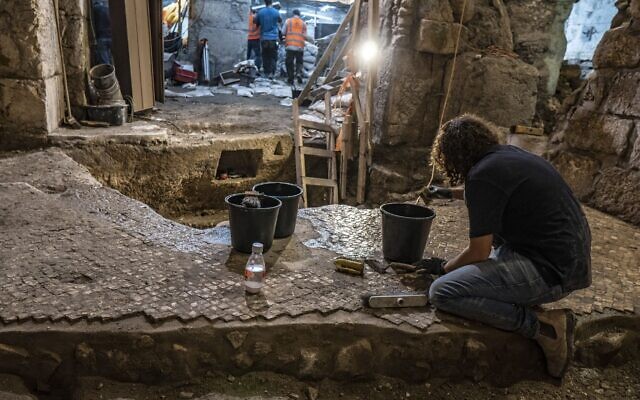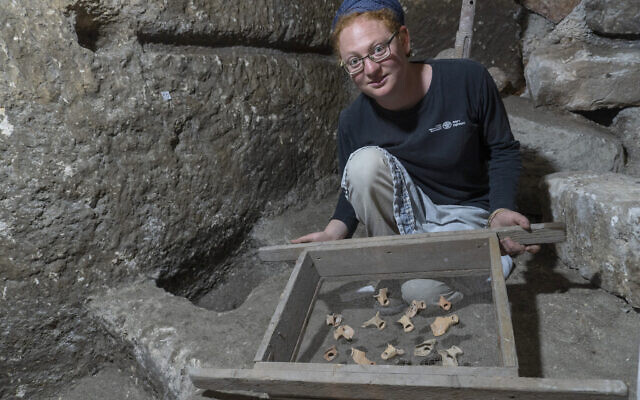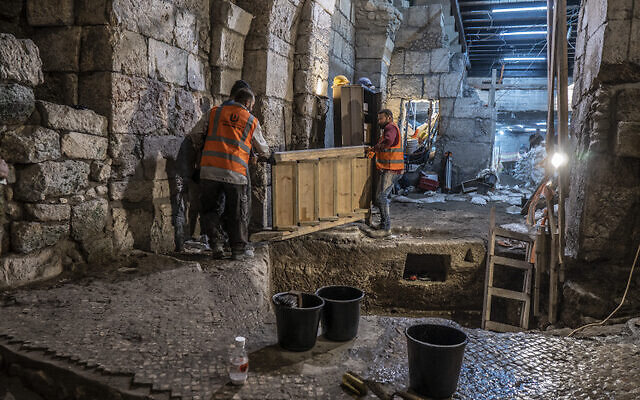Times of Israel Podcast
LISTEN: ToI takes you to a unique excavation deep under Jerusalem’s Old City
Join IAA archaeologist Barak Monnickendam-Givon on a jaw-dropping guided audio tour spanning two millennia some 7 meters under the Western Wall plaza
This week on The Times of Israel Podcast, we’re going deep under
Jerusalem’s Old City where we’re joining Israel Antiquities Authority
archaeologist Dr. Barak Monnickendam-Givon in a subterranean dig, seven
meters (23 feet) and more underground.
The Times of Israel has recently reported on several of the exciting finds at the joint IAA-Western Wall Heritage Foundation excavation that is co-directed by Monnickendam-Givon and Tehila Sadiel. Their dig site is directly under the historic Beit Strauss building, adjacent to the Western Wall Plaza, which serves as a lobby for the tunnel tours.
When we first enter the excavation, we’re standing on a wooden platform near the ceiling of a huge, excavated chamber that was once filled with dirt and debris.
At a glance you can take in different periods of Jerusalem history, starting some 10 meters down with a unique find from 2,000 years ago — a mysterious set of three rooms that were chiseled out of bedrock. In a different corner of the room, the archaeologists recently uncovered a cache of modern ammunition used by Jordanian soldiers that were likely deposited in a British Mandate water system as they were fleeing during the 1967 Six Day War.
 From above you can see a white mosaic carpet upon which rests a vast
Byzantine/Ummayad-era structure with stone pillars, high walls, and
arches that was constructed about 1,400 years ago. Like the building
that Monnickendam-Givon says stood there before it, this building was
also clearly repurposed during successive iterations of Jerusalem
history.
From above you can see a white mosaic carpet upon which rests a vast
Byzantine/Ummayad-era structure with stone pillars, high walls, and
arches that was constructed about 1,400 years ago. Like the building
that Monnickendam-Givon says stood there before it, this building was
also clearly repurposed during successive iterations of Jerusalem
history.
 Hewn out of bedrock using hand tools, including iron hammers, the
three rooms are rather spacious at circa 2.5 meters x 4 meters (8×13
feet), and two rooms at 2.5 meters x 2.5 meters. Monnickendam-Givon said
this is the first example of what appears to be a living space,
although there are numerous contemporary ritual baths and graves that
were also hewn out of rock during this era. Inside the rooms, what look
to be niches for shelves and storage, as well as doorjambs and lantern
niches, were chiseled into the bedrock.
Hewn out of bedrock using hand tools, including iron hammers, the
three rooms are rather spacious at circa 2.5 meters x 4 meters (8×13
feet), and two rooms at 2.5 meters x 2.5 meters. Monnickendam-Givon said
this is the first example of what appears to be a living space,
although there are numerous contemporary ritual baths and graves that
were also hewn out of rock during this era. Inside the rooms, what look
to be niches for shelves and storage, as well as doorjambs and lantern
niches, were chiseled into the bedrock.
 Back then, the workmen would have spent months chiseling into the
bedrock, and today you can still clearly see where their hammers struck,
two millennia ago. We still don’t really know what these rooms were
used for, but in the podcast we’ll hear some more of
Monnickendam-Givon’s thoughts.
Back then, the workmen would have spent months chiseling into the
bedrock, and today you can still clearly see where their hammers struck,
two millennia ago. We still don’t really know what these rooms were
used for, but in the podcast we’ll hear some more of
Monnickendam-Givon’s thoughts.
 Towards the end of the podcast, Monnickendam-Givon opens up the
artifacts locker and shows us the rusty Jordanian ammunition his team
uncovered last week. It was discovered in a British Mandate/late-Ottoman
period water system and likely stashed there during the 1967 Six Day
War as Amman battled Israel over the Old City. Based on the stamp found
on some of the bullet casings, the IAA’s Assaf Peretz said the
ammunition had been manufactured in Leeds in 1956, and was later
provided to the Jordanian army.
Towards the end of the podcast, Monnickendam-Givon opens up the
artifacts locker and shows us the rusty Jordanian ammunition his team
uncovered last week. It was discovered in a British Mandate/late-Ottoman
period water system and likely stashed there during the 1967 Six Day
War as Amman battled Israel over the Old City. Based on the stamp found
on some of the bullet casings, the IAA’s Assaf Peretz said the
ammunition had been manufactured in Leeds in 1956, and was later
provided to the Jordanian army.
 During our subterranean conversation, Monnickendam-Givon also speaks
about a Latin inscription that now serves as a Lego block, lets us hold a
two millennia-old stone mug, and trusts The Times of Israel to not drop
a rare complete 2,000-year-old oil lamp.
During our subterranean conversation, Monnickendam-Givon also speaks
about a Latin inscription that now serves as a Lego block, lets us hold a
two millennia-old stone mug, and trusts The Times of Israel to not drop
a rare complete 2,000-year-old oil lamp.
The Times of Israel podcasts are available for download on iTunes, Soundcloud, TuneIn, Pocket Casts, Stitcher, PlayerFM or wherever you get your podcasts.
The Times of Israel has recently reported on several of the exciting finds at the joint IAA-Western Wall Heritage Foundation excavation that is co-directed by Monnickendam-Givon and Tehila Sadiel. Their dig site is directly under the historic Beit Strauss building, adjacent to the Western Wall Plaza, which serves as a lobby for the tunnel tours.
When we first enter the excavation, we’re standing on a wooden platform near the ceiling of a huge, excavated chamber that was once filled with dirt and debris.
At a glance you can take in different periods of Jerusalem history, starting some 10 meters down with a unique find from 2,000 years ago — a mysterious set of three rooms that were chiseled out of bedrock. In a different corner of the room, the archaeologists recently uncovered a cache of modern ammunition used by Jordanian soldiers that were likely deposited in a British Mandate water system as they were fleeing during the 1967 Six Day War.
It’s frankly jaw-dropping.

Excavation and conversation work under
the Jerusalem Old City’s ‘Beit Straus’ complex, May 2020. (Shai
HaLevi/Israel Antiquities Authority)
We’ll begin our conversation with
Monnickendam-Givon under that Byzantine/Ummayad-era structure, deep down
under bedrock, inside the bottom layer of a unique, terraced three-room
system of rock-hewn chambers. It is the only one of its kind that has
been discovered in Jerusalem’s Old City, and dates from 2,000 years ago,
just prior to the fall of the Second Temple.

Excavation co-director Tehila Saldiel
showing some of the artifacts from the excavations under Beit Straus in
Jerusalem’s Old City, near the Western Wall, May 2020. (Shai
HaLevi/Israel Antiquities Authority)

The dig site under the Western Wall where archaeologists discovered old Jordanian ammunition (Israel Antiquities Authority)

Excavation and conversation work under
the Jerusalem Old City’s ‘Beit Straus’ complex, May 2020. (Shai
HaLevi/Israel Antiquities Authority)

Magazine of a Bren machine gun found
during an excavation under the Western Wall tunnels (Yoli Schwartz,
Israel Antiquities Authority)
The Times of Israel podcasts are available for download on iTunes, Soundcloud, TuneIn, Pocket Casts, Stitcher, PlayerFM or wherever you get your podcasts.

Comments
Post a Comment